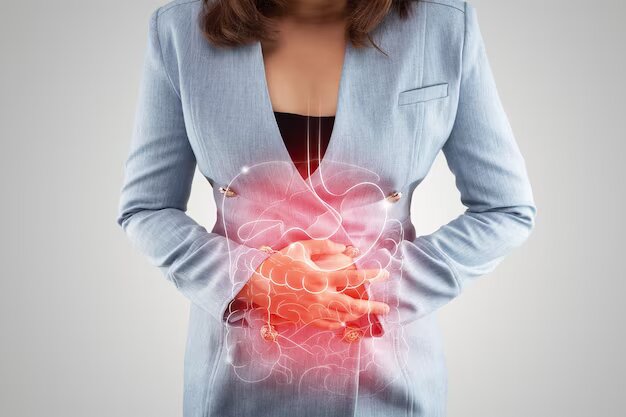
INFLAMMATORY BOWEL DISEASE
Inflammatory Bowel Disease or IBD in Delhi NCR is referred to as a condition in which, inflammation occurs all over the Gastrointestinal tract. The inflammation occurs due to various multiple factors and Acidic PH of the stomach which damages the mucus membrane and results in ulcers and inflammation. This inflammation results in multiple sign and symptoms such as pains, cramps, vomiting, heartburn etc., when these symptoms bother an individual collectively; it is termed as Inflammatory Bowel Syndrome.
IBS is characterised by two specific disease conditions i.e. Chron’s Disease and Ulcerative Colitis.
CHRON’S DISEASE
It is a type if inflammatory bowel disease which causes the Gastro-intestinal tract to become swollen and irritated.
The Symptoms of Chron’s Diesease I
nclude:
- Nausea
- Vomiting
- Abdominal cramps
- Fever
- Exhaustion
- Joint Pain
- Redness in eyes
- Red bumps on skin
ULCERATIVE COLITIS
It is a disease condition in which person experiences ulcers onto the internal lining of the colon. Unlike Chron’s disease it is only limited to Colon and not the complete GI Tract though the symptoms of both the diseases are same.
The sign and symptoms of Ulcerative colitis includes
- Bloody stool
- Persistent diarrhoea
- Abdominal cramps
- Vomiting
- Recurring urge to pass stool
- Bowel incontinence
Chron’s vs. Ulcerative Colitis
Both of these Diseases come under Irritable Bowel Syndrome but the different which makes both of them unique is the location of the inflammation.
Pt. Suffering from Chron’s Disease will experience an Inflammation all over the GI tract and patient will experience Upper GI symptoms, whereas ulcerative colitis affects the lower GI tract mainly the small intestine. Therefore it gives the Lower GI Symptoms such as diarrhoea, bloody stool, bowel incontinence etc.
Causes of Ibd in delhi ncr
The exact root- cause of the disease is unknown yet but there are certain risk factors which can lead to IBD.
The researched causes of IBS/IBD are as follows:-
Weakened immune system: the immune system may be weekend due to some underlying medical condition such as kidney disease, liver disease etc
Viral cause: There are certain viral agents which enters into the body and givers serious health issues such as IBD.
Bacterial Invasion: Our gut consists of wide variety of bacteria’s such as E.coli which are responsible for the proper functioning of the gut but when these bacteria’s flourish more than the desired quantity, it gives serious gut issues.
Genetic: you might suffer from IBS/IBD if someone in your family has suffered from the disease. Although the chances of getting infected from the disease are rare through genes but still the person who had a family history of Irritable Bowel Syndrome becomes more prone to get the disease.
Sedentary Lifestyle: The improper eating habits and living a sedentary life can be a cause of irritable bowel syndrome as it leads to obesity and other gut issues.
Co-morbidity: If a person is already suffering from any gut issue such as GERD, diarrhoea etc the there are chances of that person might get irritated bowel.
Sign and symptoms of IBD in delhi ncr
- Loss of appetite: Patient will not feel like eating anything and the appetite of the patient might reduce to a greater extent.
- Abdominal pain/cramps: the patient will experience intense pain into the abdomen due to ulcer formation
- Fever: It might occur due to the infection present in the gut
- Nausea: The patient might experience nausea and vomiting due to upper GI inflammation
- Vomiting: The patient may experience Bilious or non-bilious vomiting due to upper GI inflammation.
- Exhaustion: Due to recurrent and long term illness patient might feel exhausted
- Joint pain: Due to acid base imbalance in the body, the calcium level in the body decreases leading to joint pain.
- Pain and redness in eyes.
- Red bumps on the skin.
- Recurrent and persistent diarrhoea: Due to the ulcer formation and inflammation of the lower GI tract mainly the small intestine, their might be the chances of recurrent and persistent diarrhoea.
- Bloody stools: As a result of ulcer formation the internal lining of the stomach gets disturbed which may leads to bloody stool.
- Weightloss
Diagnosis of ibd in delhi ncr
Endoscopy: in this procedure an endoscope a long sterile tube with camera placed on its tip is administered into the GI tract through mouth .The camera on the tip of the endoscope is connected to the monitor outside the body which shows a clear image of the GI tract. It can be further diagnosed easily for ulcers, sores etc.
Colonoscopy: in this procedure a colonoscopy is administered inside the body through anus which gives a clear picture of the lower GI tract.
Contrast / Non-contrast Radiography: in this a radiological image of GI tract is taken through x ray to diagnose the underlying disease
X-ray: It involves the rays to see cause of inflammation in the GI tract
Magnetic resonance imaging (MRI): It involves advanced images and study to have a better view of GI tract to find the localization of the ulcers:
Stool test: It is done to check the bacterial growth into the intestine.
CT scan (Computed Tomography): It is the advanced type of scan which gives a 3d image of the GI tract
CBC: It gives the idea of the total blood composition
Blood tests: Blood tests such as serum lipase, serum amylase, KFT, LFT, blood counts etc
RISK FACTORS
AGE: According to the researches 15-20% of total people suffering from IBD are of age group above 60 years.
FAMILY HISTORY: People with family history of IBD or IBS are more prone to get the disease.
OBESITY: Obesity is the root cause of all the gut issues such as GERD, IBD, IBS etc.
SEDENTARY LIFETSYLE: Sedentary lifestyle, lack of physical activity and binge eating is the major risk factor of inflammatory bowel disease.
CIGGARATTE SMOKING: Anti-social habits such as smoking and drinking leads to gastro-intestinal ulcers which further leads top IBD and IBS
OVERUSE OF DRUGS: Overuse of NON-STEROIDAL ANTI-INFLAMMATORY DRUGS and other analgesic medications can damage the mucus membrane resulting in ulcer formation.
COMPLICATIONS
- Colon cancer
- Severe dehydration
- Perforated colon
- Anal fissure
- Bowel obstruction
- Blood clots
- Malnutrition
TREATMENT of ibd in delhi ncr
There is a limited scope of treatment in case of Inflammatory Bowel Disease. Functional Medicine till date is the best treatment offered in case of inflammatory bowel disease.
- SELF CARE
For the people who has mild or no symptoms, self care at home is the best treatment. People with less or no symptoms can manage Inflamed Bowel by just keeping a check on their diet. Right diet with less carbohydrate and less spices is best for people with IBD.
- MEDICAL TREATMENT:
The medical treatment in case of IBD includes the symptoms for symptomatic relief.
- 5-aminosalicyclic acids.
- Immune modulators
- Corticosteroids.
- Antibiotics
- Antiemetic
- Probiotic
- Proto-pump-inhibitors
These are the various examples of certain medications which can be used to treat Inflammatory Bowel Disease. However it is very necessary to consult a doctor before taking any drug. The patients are advised not to take drugs on their own.
- SURGICAL TREATMENT
The surgical treatment involves the removal of the damaged part of the GI Tract. It might be Colon or any other small portion which can be ressected surgically by a general surgeon or any gastro intestinal surgeon.
PREVENTION
One can prevent inflammatory bowel syndrome by taking following measures:-
- Eat less and eat more often
- Avoid anti social habits such as smoking and drinking
- Take spices in a limited quantity
- Consume less carbohydrate
- Avoid caffeinated products
- Avoid living a sedentary lifestyle
- Do exercise daily
FAQ’S
What is IBD?
Inflammatory bowel disease is a condition in which the gastrointestinal membrane gets inflamed due to damage of mucosal membrane and other factors. It consists of two different medical conditions such as chron’s disease and ulcerative colitis.
WHAT IS THE TREATMENT OF IBD?
IBD consists of three different types of treatments i.e. Self care, Medical management and surgical management. The self care is advised for the people who have very few to zero symptoms whereas medical and surgical treatment are for those which severe symptoms.
CAN IBD BE TREATED WITH MEDICATIONS?
Yes, IBD can be treated with medications and Neutraceuticals. It can be treated well with the help of functional medicine.
IS IBD AND IBD SAME?
Inflammatory Bowel Disease is a condition where the gastrointestinal tract of a patient gets inflamed them this particular disease gives various type of sign and symptoms it becomes inflammatory bowel syndrome. Syndrome is basically defined a s the group of disease.

